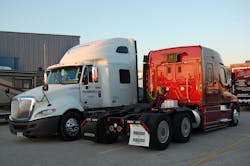While a new report issued this week by the American Transportation Research Institute (ATRI) highlighted how rising traffic congestion in the U.S. is becoming a more expensive problem for the trucking industry, it is a problem also being aggravated in part by the ongoing shortage of truck parking across the country as well.
“Trucking parking and traffic congestion: these issues are linked,” Rebecca Brewster, ATRI’s president and COO, explained to Fleet Owner; also noting that truck parking is “a top research priority” for the group this year.
“The hypothesis is if drivers had more flexibility in terms of hours of service (HOS) rules and available parking places, would they be able to make decision not to drive in the most congested locations during the most congested times of the day? Yet making that decision relies in part on parking options,” she said.
Mobile app developer TruckerPath recently issued a report analyzing the truck parking issue and found that many drivers lose an estimated 11 hours per month searching for truck parking, which amounts to around $600 of wages and additional $60 of profit for the fleet.
TruckerPath also discovered that 79% of drivers it polled are forced to violate HOS rules because they could not find parking.
Lack of truck parking or the ability to quickly find parking is cutting into driver productivity as well, according to the company’s survey, reducing available on-duty time for driving, making deliveries, refueling, etc.
Some 61% of the drivers polled by TruckerPath said they start looking for parking an hour before their allotted HOS on-duty time expires, with 21% saying they spend over an hour doing so.
Brewster added that “there is no question” that sitting in traffic is a fatigue-causing experience and that the ability to rest and recover from it requires a place for a driver to park his or her tractor-trailer. “So parking is definitely tied to the traffic congestion issue,” she noted.
Brewster also emphasized that “we are really are getting to the ‘perfect storm’” in terms of the problems posed by traffic congestion and the lack of adequate truck parking.
“High consumer demand [for goods] means more vehicles on road, and while that is great for our industry, the current infrastructure can’t handle that traffic situation we have here now,” she said. “We need to focus on improving and expanding [roadway] infrastructure.”
About the Author
Sean Kilcarr
Editor in Chief
Sean Kilcarr is a former longtime FleetOwner senior editor who wrote for the publication from 2000 to 2018. He served as editor-in-chief from 2017 to 2018.
